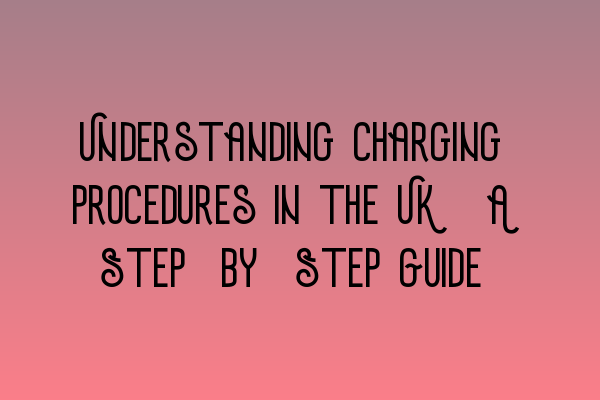Understanding Charging Procedures in the UK: A Step-by-Step Guide
Welcome to our comprehensive guide on understanding charging procedures in the UK. When it comes to criminal law, charging procedures play a crucial role in how cases are handled and resolved. Whether you are a legal professional, law student, or simply someone interested in gaining knowledge about criminal proceedings, this guide will provide you with a thorough understanding of the steps involved in the charging process.
Step 1: Police Investigation
The charging process begins with a police investigation. When a crime is reported, the police will conduct an investigation to gather evidence and determine whether there are grounds for charging an individual with a criminal offense. This investigation may involve interviewing witnesses, collecting physical evidence, and analyzing forensic reports.
If you are interested in learning more about the investigative process, our article on SQE 1 Preparation Courses provides in-depth information on this subject.
Step 2: Arrest
If the police have reasonable grounds to believe that someone has committed a criminal offense, they can make an arrest. An arrest is the legal process of taking a person into custody to be charged with a crime. This typically involves the detainment of the suspect and their transportation to a police station for further questioning.
To test your knowledge on arrest procedures, you may find our article on SQE 1 Practice Exam Questions insightful.
Step 3: Detention and Questioning
Once a suspect is arrested, they may be held in police custody for a specific period, known as detention. During this time, the police have the power to question the suspect in order to gather further evidence and obtain a confession. However, there are strict rules in place to protect the rights of the accused, such as the right to legal representation and the right to remain silent.
To prepare yourself for the complexities of detention and questioning, our article on SQE 1 Practice Mocks FLK1 FLK2 offers valuable resources and practice materials.
Step 4: Charging Decision
After the police investigation is complete and all relevant evidence has been gathered, a charging decision is made by the Crown Prosecution Service (CPS). The CPS is an independent public authority responsible for prosecuting criminal cases in England and Wales. They review the evidence provided by the police and decide whether there is enough evidence to charge the suspect with a criminal offense.
If you are interested in pursuing a career in criminal law and want to learn more about the role of the CPS, our article on SQE 2 Preparation Courses will provide you with valuable insights.
Step 5: Charging Document
If the CPS decides to charge the suspect, a formal charging document will be prepared. This document is known as an “Indictment” for more serious offenses, or a “Charge Sheet” for less serious offenses. It contains details of the offense(s) committed, the legislation under which the suspect is being charged, and any additional relevant information.
To stay up to date with the latest SRA SQE exam dates and other important information, we recommend checking out our article on SRA SQE Exam Dates.
Step 6: First Court Appearance
Once the charging document has been prepared, the suspect will make their first appearance in court. This is known as the initial court appearance or the first hearing. During this hearing, the charges against the suspect will be read out, and the defendant will have the opportunity to enter a plea of guilty or not guilty.
If you are interested in learning more about court proceedings, our guide on SQE 1 Practice Exam Questions provides a comprehensive overview of the topic.
Conclusion
Understanding charging procedures is essential for anyone involved in the criminal justice system. From the initial police investigation to the first court appearance, each step plays a crucial role in determining the outcome of a case. By familiarizing yourself with these procedures, you can better navigate the complexities of criminal law.
If you have any questions or require further assistance, our team at SQE Criminal Law & Practice Law UK is here to help. Feel free to reach out to us for expert advice and guidance.
